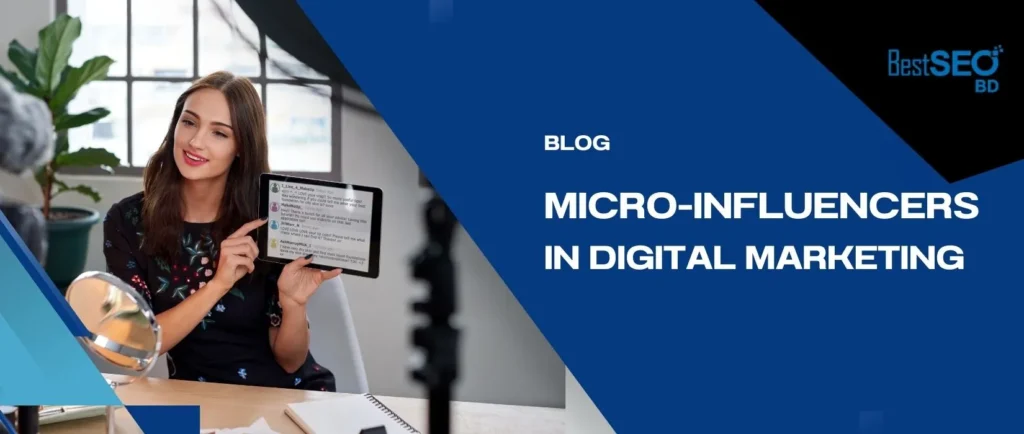Micro-influencers in digital marketing are emerging as the new champions of brand advocacy. Gone are the days of mega-celebrities dominating influencer marketing; today, it’s the relatable faces and voices of micro-influencers that are capturing the hearts and minds of audiences worldwide. In this blog post, we’ll delve into the phenomenon of micro-influencers, exploring their rise to prominence, the benefits they offer to brands, and how businesses can effectively leverage their power in digital marketing strategies.
The Emergence of Micro-Influencers in Digital Marketing
Micro-influencers, typically defined as individuals with a modest but highly engaged social media following, have gained momentum in recent years. Unlike macro-influencers with millions of followers, micro-influencers typically have follower counts ranging from a few thousand to a hundred thousand. What sets them apart is their niche expertise, genuine passion for their content, and high levels of engagement with their audience.
Authenticity Over Reach
One of the key advantages of micro-influencers lies in their authenticity. Unlike celebrities or macro-influencers, who often promote a wide range of products across various industries, micro-influencers tend to focus on specific niches or interests. This focused approach fosters a deeper connection with their audience, who view them as trusted peers rather than distant celebrities. As a result, recommendations from micro-influencers are perceived as more genuine and trustworthy, leading to higher conversion rates for brands.
Benefits of Micro-Influencer Marketing
- High Engagement: Micro-influencers typically have higher engagement rates compared to macro-influencers or celebrities. Their smaller, more niche audiences are often more engaged and receptive to their content, resulting in better interaction and conversion rates for brands.
- Cost-effectiveness: Social Media Marketing is often more budget-friendly than partnering with macro-influencers or celebrities. Since micro-influencers have smaller followings, they usually charge lower fees or may even be open to partnerships in exchange for products or services.
- Targeted Reach: Micro-influencers excel at reaching highly targeted audiences within specific niches or demographics. Brands can leverage this targeted reach to connect with their ideal customers and drive meaningful engagement and conversions.
- Authenticity and Trust: As mentioned earlier, micro-influencers are valued for their authenticity and credibility. Their genuine passion for their niche, coupled with their close connection to their audience, makes their recommendations more trustworthy and impactful.
Effective Strategies for Leveraging Micro-Influencers in Digital Marketing
- Identify Relevant Influencers: Conduct thorough research to identify micro-influencers whose niche aligns with your brand and target audience. Look for influencers who are genuinely passionate about your industry or product category.
- Build Genuine Relationships: Approach influencer partnerships as collaborations rather than transactions. Take the time to build genuine relationships with micro-influencers, and engage with their content authentically before reaching out with partnership opportunities.
- Encourage Authentic Content: Give micro-influencers creative freedom to develop content that resonates with their audience while incorporating your brand message naturally. Authenticity is key, so avoid overly scripted or promotional content.
- Track and Measure Results: Use analytics tools to track the performance of influencer campaigns and measure key metrics such as engagement, reach, and conversions. This data will help you assess the effectiveness of your partnerships and refine your strategies moving forward.
Understanding the Influence of Micro-Influencers
Micro-influencers are not just individuals with a significant following on social media; they are tastemakers, trendsetters, and trusted advisors within their respective niches. Their influence extends beyond mere follower counts; it is rooted in authenticity, relevance, and genuine engagement.
Unlike macro-influencers or celebrities, who may have millions of followers but lack deep connections with their audience, micro-influencers thrive on building meaningful relationships with their followers. They interact with their audience on a personal level, responding to comments, messages, and inquiries with care and authenticity. As a result, their recommendations carry significant weight and influence among their followers.
The Power of Authenticity in Marketing
In the age of social media, consumers are becoming increasingly savvy at detecting inauthenticity. They crave genuine connections and value transparency from the brands they engage with. This is where micro-influencers excel. When a micro-influencer recommends a product or service, it doesn’t feel like a sales pitch; it feels like a recommendation from a trusted friend.
The rise of micro-influencers has presented brands with a unique opportunity to connect with their target audience in a more authentic and meaningful way. By leveraging the power of micro-influencer marketing, businesses can tap into niche communities, drive high engagement, and foster brand loyalty.
One of the key benefits of micro-influencer marketing is its cost-effectiveness. Unlike macro-influencers or celebrities, who may command hefty fees for their endorsements, micro-influencers are often more accessible to brands with limited budgets. Many micro-influencers are willing to collaborate with brands in exchange for products or services, making it a cost-effective option for businesses of all sizes.
Additionally, micro-influencers offer a more targeted reach compared to their macro counterparts. Their niche focus allows brands to connect with highly specific segments of their target audience, resulting in more meaningful engagement and higher conversion rates.
Conclusion
In the ever-evolving landscape of digital marketing, authenticity is paramount. Micro-influencers offer a unique opportunity for brands to connect with their target audience in a genuine and meaningful way. Businesses can tap into niche communities, drive high engagement, and build lasting relationships with their customers by leveraging the power of micro-influencers in digital marketing. As you navigate the world of influencer marketing, remember that authenticity, relevance, and genuine connection are the keys to success.
FAQs
How do you define a micro-influencer?
Micro-influencers are individuals who have a modest but highly engaged following on social media, typically ranging from a few thousand to a hundred thousand followers. They are known for their niche expertise, authenticity, and high levels of engagement with their audience.
What industries are best suited for micro-influencer marketing?
Micro-influencer marketing can be effective across a wide range of industries, but it tends to perform particularly well in niche markets or industries with passionate and highly engaged audiences. Examples include beauty, fashion, fitness, food and beverage, travel, and lifestyle.
How can I find the right micro-influencers for my brand?
Start by conducting research on social media platforms to identify influencers whose niche aligns with your brand and target audience. Look for influencers who are genuinely passionate about your industry or product category, and whose values align with those of your brand. Additionally, consider using influencer marketing platforms or agencies to streamline the process of finding and collaborating with micro-influencers.



